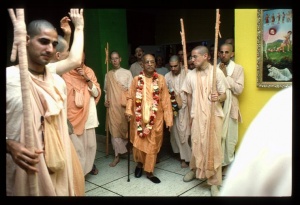ISO 3 (1974)

A.C. Bhaktivedanta Swami Prabhupada
Mantra Three
- asuryā nāma te lokā
- andhena tamasāvṛtāḥ
- tāṁs te pretyābhigacchanti
- ye ke cātma-hano janāḥ
SYNONYMS
asuryāḥ—meant for the asuras; nāma—famous by the name; te—those; lokāḥ—planets; andhena—by ignorance; tamasā—by darkness; āvṛtāḥ—covered; tān—those planets; te—they; pretya—after death; abhigacchanti—enter into; ye—anyone; ke—everyone; ca—and; ātma-hanaḥ—the killers of the soul; janāḥ—persons.
TRANSLATION
The killer of the soul, whoever he may be, must enter into the planets known as the worlds of the faithless, full of darkness and ignorance.
PURPORT
Human life is distinguished from animal life due to its heavy responsibilities. Those who are cognizant of these responsibilities and who work in that spirit are called suras (godly persons), and those who are neglectful of these responsibilities or who have no information of them are called asuras (demons). Throughout the universe there are only these two types of human being. In the Ṛg Veda it is stated that the suras always aim at the lotus feet of the Supreme Lord Viṣṇu and act accordingly. Their ways are as illuminated as the path of the sun.
Intelligent human beings must always remember that the soul obtains a human form after an evolution of many millions of years in the cycle of transmigration. The material world is sometimes compared to an ocean, and the human body is compared to a solid boat designed especially to cross this ocean. The Vedic scriptures and the ācāryas, or saintly teachers, are compared to expert boatmen, and the facilities of the human body are compared to favorable breezes that help the boat ply smoothly to its desired destination. If, with all these facilities, a human being does not fully utilize his life for self-realization, he must be considered ātma-hā, a killer of the soul. Śrī Īśopaniṣad warns in clear terms that the killer of the soul is destined to enter into the darkest region of ignorance to suffer perpetually.
There are swine, dogs, camels, asses, etc., whose economic necessities are just as important to them as ours are to us, but the economic problems of these animals are solved only under nasty and unpleasant conditions. The human being is given all facilities for a comfortable life by the laws of nature because the human form of life is more important and valuable than animal life. Why is man given a better life than that of the swine and other animals? Why is a highly placed government servant given better facilities than those of an ordinary clerk? The answer is that a highly placed officer has to discharge duties of a higher nature. Similarly, the duties human beings have to perform are higher than those of animals, who are always engaged in simply feeding their hungry stomachs. Yet the modern soul-killing civilization has only increased the problems of the hungry stomach. When we approach a polished animal in the form of a modern civilized man and ask him to take interest in self-realization, he will say that he simply wants to work to satisfy his stomach and that there is no need of self-realization for a hungry man. The laws of nature are so cruel, however, that despite his denunciation of the need for self-realization and his eagerness to work hard to fill his stomach, he is always threatened by unemployment.
We are given this human form of life not to work hard like asses, swine and dogs but to attain the highest perfection of life. If we do not care for self-realization, the laws of nature force us to work very hard, even though we may not want to do so. Human beings in this age have been forced to work hard like the asses and bullocks that pull carts. Some of the regions where the asuras are sent to work are revealed in this verse of Śrī Īśopaniṣad. If a man fails to discharge his duties as a human being, he is forced to transmigrate to the asurya planets and take birth in degraded species of life to work hard in ignorance and darkness.
In the Bhagavad-gītā (6.41-43) it is stated that a man who enters upon the path of self-realization but does not complete the process, despite having sincerely tried to realize his relationship with God, is given a chance to appear in a family of śuci or śrīmat. The word śuci indicates a spiritually advanced brāhmaṇa, and śrīmat indicates a vaiśya, a member of the mercantile community. So the person who fails to achieve self-realization is given a better chance in his next life due to his sincere efforts in this life. If even a fallen candidate is given a chance to take birth in a respectable and noble family, one can hardly imagine the status of one who has achieved success. By simply attempting to realize God, one is guaranteed birth in a wealthy or aristocratic family. But those who do not even make an attempt, who want to be covered by illusion, who are too materialistic and too attached to material enjoyment, must enter into the darkest regions of hell, as confirmed throughout the Vedic literature. Such materialistic asuras sometimes make a show of religion, but their ultimate aim is material prosperity. The Bhagavad-gītā (16.17-18) rebukes such men by calling them ātma-sambhāvita, meaning that they are considered great only on the strength of deception and are empowered by the votes of the ignorant and by their own material wealth. Such asuras, devoid of self-realization and knowledge of īśāvāsya, the Lord's universal proprietorship, are certain to enter into the darkest regions.
The conclusion is that as human beings we are meant not simply for solving economic problems on a tottering platform but for solving all the problems of the material life into which we have been placed by the laws of nature.